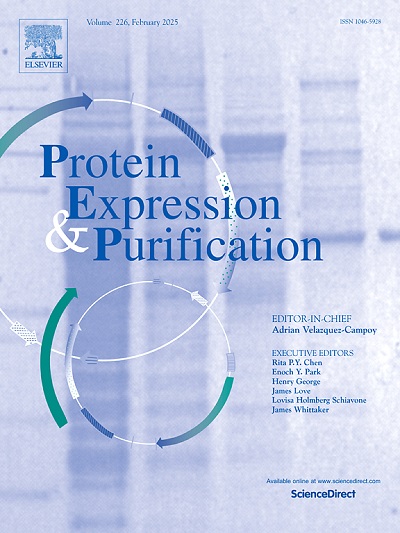A magnetic bead-based fluorescent substrate for sensitive assay of SARS-CoV-2 3C-like protease activity
IF 1.2
4区 生物学
Q4 BIOCHEMICAL RESEARCH METHODS
引用次数: 0
Abstract
The 3C-like protease (3CLpro) of SARS-CoV-2 is a crucial target for antiviral drugs due to its essential role in viral polyprotein processing. In this study, we designed and produced a modular fluorescent recombinant substrate (6×His-ECFP-AVLQSGFRK-EYFP), which was then immobilized on Ni-NTA magnetic beads (Ni-NTA-6×His-ECFP-AVLQSGFRK-EYFP) for the assay of 3CLpro activity. Upon cleavage at the specific AVLQ↓SG motif, the EYFP fragment was released into the supernatant and quantified via fluorescence measurement (Ex/Em = 480/528 nm). A standard curve (y = 725.29x − 52.356; R2 = 0.998) was obtained, enabling accurate quantification of the cleaved product and kinetic parameters. The assay using the designed substrate revealed a Km of 22.01 ± 3.5 μM, kcat of 0.021 s-1, and catalytic efficiency (kcat/Km) of 946 M-1.s-1. The assay showed ∼50-fold greater sensitivity compared to SDS-PAGE and the inhibitory effect of GC376 for 3CLpro was also determined, with IC50 of 0.88 μM. Since the modular substrate design allows for substitution of the N-terminal domain and cleavage motif, our development of the substrate and assay could be expanded to other high-specificity proteases.
基于磁珠的荧光底物用于sars - cov - 23c样蛋白酶活性的灵敏测定。
SARS-CoV-2的3c样蛋白酶(3CLpro)在病毒多蛋白加工过程中发挥重要作用,是抗病毒药物的重要靶点。在本研究中,我们设计并制作了模块化荧光重组底物(6×His-ECFP-AVLQSGFRK-EYFP),然后将其固定在Ni-NTA磁珠(Ni-NTA-6×His-ECFP-AVLQSGFRK-EYFP)上,用于测定3CLpro的活性。在特定的AVLQ↓SG基序上切割后,EYFP片段被释放到上清中,并通过荧光测量(Ex/Em = 480/528 nm)进行定量。得到标准曲线(y = 725.29x - 52.356; R2 = 0.998),可准确定量裂解产物及动力学参数。实验结果表明,该底物的Km为22.01±3.5 μM, kcat为0.021 s-1,催化效率(kcat/Km)为946 m -1 s-1。与SDS-PAGE相比,该方法的灵敏度提高了约50倍,并且还确定了GC376对3CLpro的抑制作用,IC50为0.88 μM。由于模块化底物设计允许替换n端结构域和切割基序,因此我们的底物开发和检测可以扩展到其他高特异性蛋白酶。
本文章由计算机程序翻译,如有差异,请以英文原文为准。
求助全文
约1分钟内获得全文
求助全文
来源期刊

Protein expression and purification
生物-生化研究方法
CiteScore
3.70
自引率
6.20%
发文量
120
审稿时长
32 days
期刊介绍:
Protein Expression and Purification is an international journal providing a forum for the dissemination of new information on protein expression, extraction, purification, characterization, and/or applications using conventional biochemical and/or modern molecular biological approaches and methods, which are of broad interest to the field. The journal does not typically publish repetitive examples of protein expression and purification involving standard, well-established, methods. However, exceptions might include studies on important and/or difficult to express and/or purify proteins and/or studies that include extensive protein characterization, which provide new, previously unpublished information.
 求助内容:
求助内容: 应助结果提醒方式:
应助结果提醒方式:


